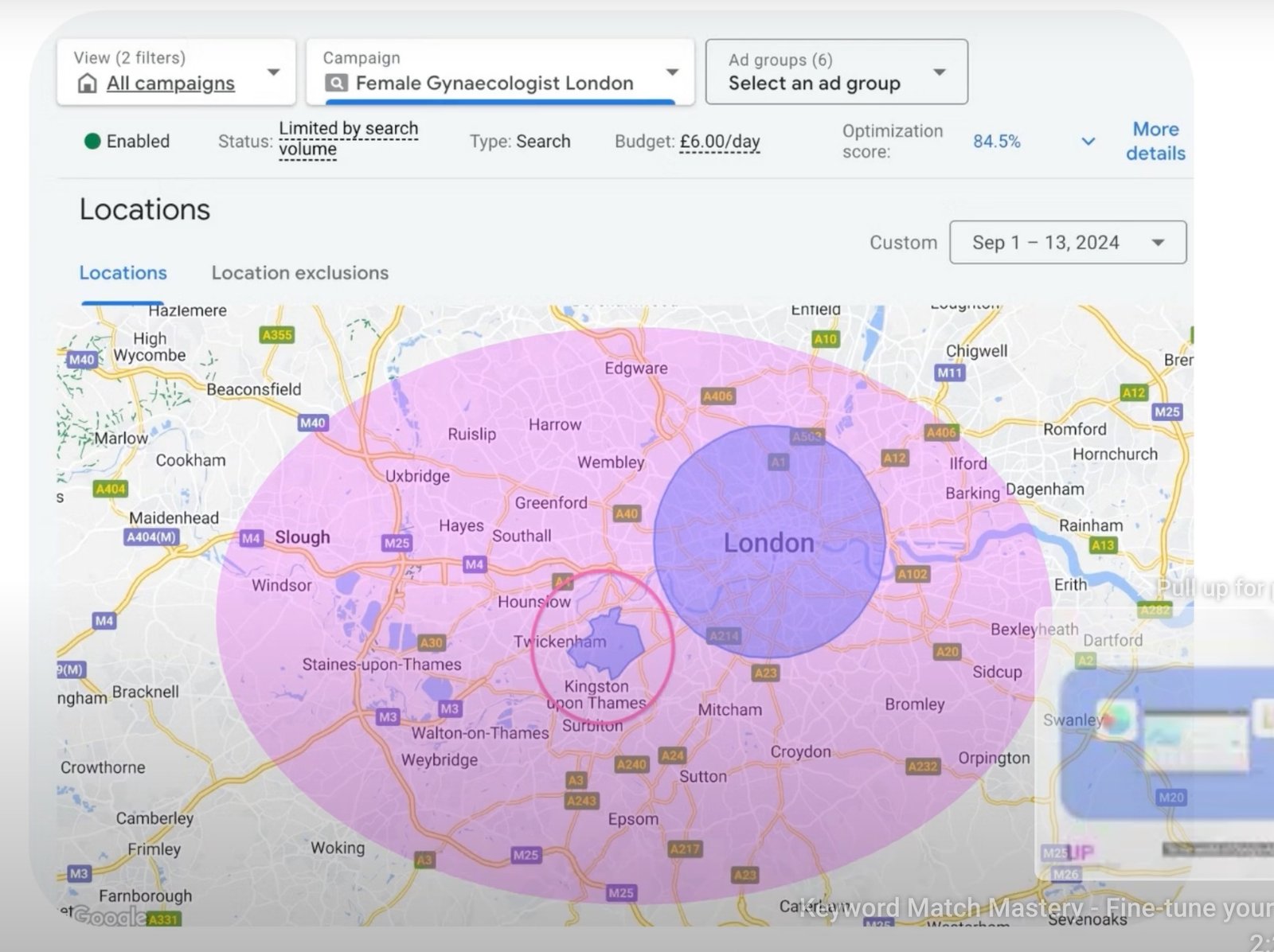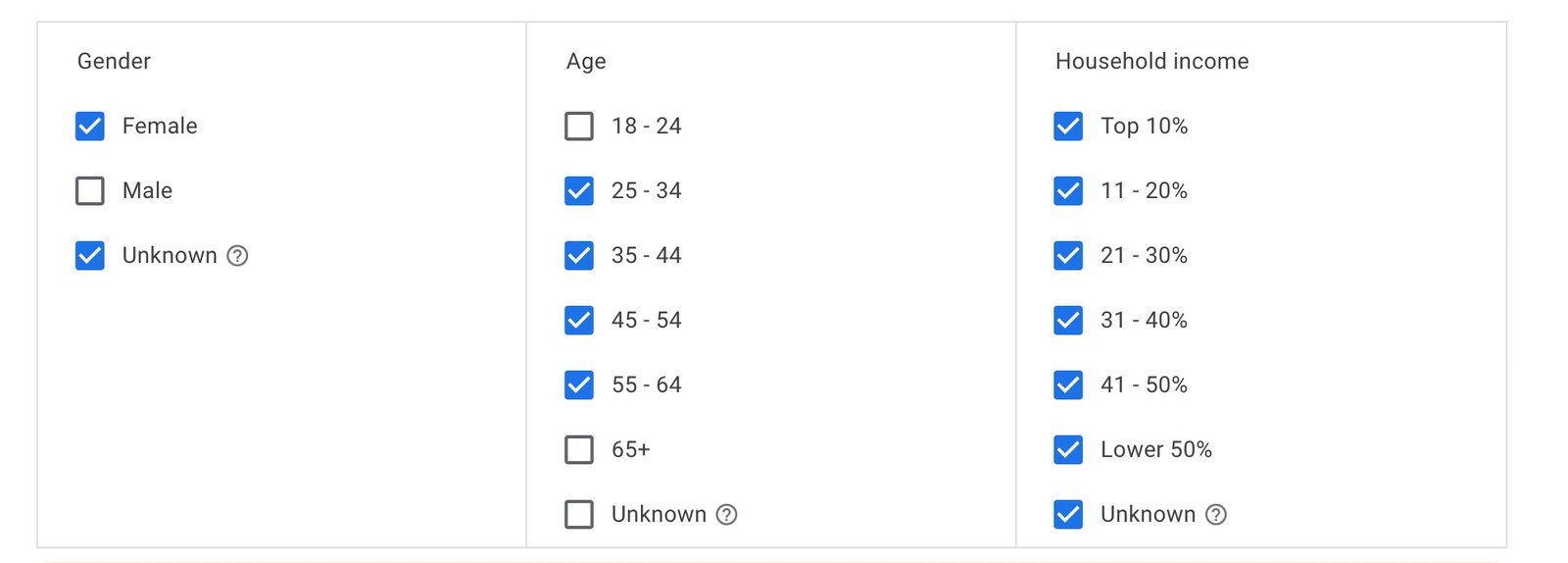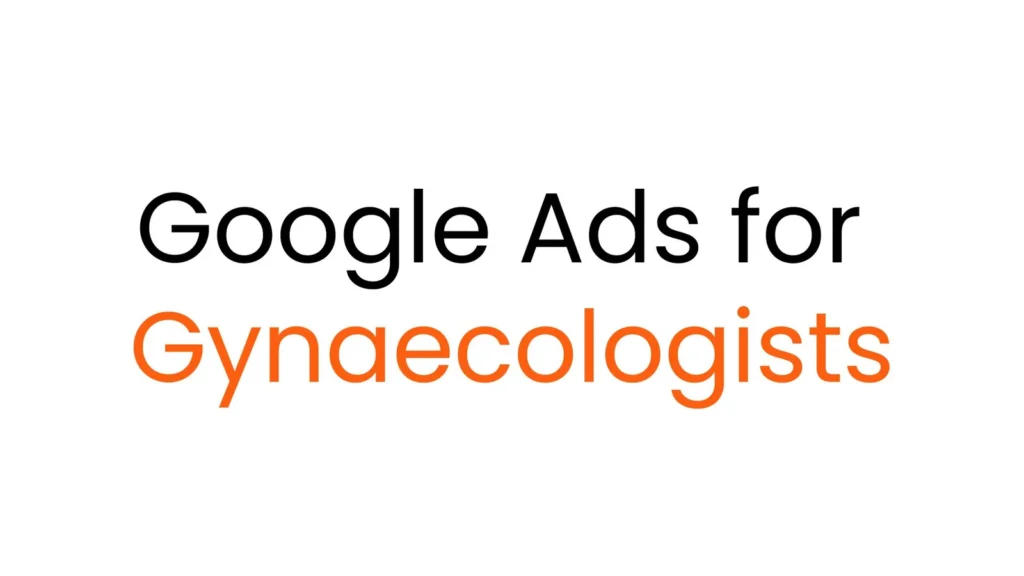In today’s digital landscape, having a robust online presence is essential for any medical practice, especially for gynaecology clinics looking to connect with new patients. Google Ads functions as a strategic tool to bridge the gap between your clinic and individuals searching for gynaecological services online. With the right strategies, your clinic’s advertisements can be prominently displayed at the top of search results, significantly boosting your clinic’s visibility and ensuring that those who need your services the most can find you quickly and easily.
By using targeted Google Ads, your clinic can appear in front of prospective patients who are actively searching for services like prenatal care, PCOS treatment, or minimally invasive surgeries. This type of advertising allows you to optimize your marketing spend by ensuring your clinic is reaching the right audience at the most opportune time.
For example, when a woman types in a search query like “gynaecologist near me” or “PCOS specialist in [city name],” clinics that use Google Ads effectively can ensure they are visible at the top of the search results, right when patients are ready to make healthcare decisions. The ability to place your clinic in front of these potential patients can significantly enhance your online presence and drive more inquiries and appointments. This is particularly beneficial for clinics looking to expand their patient base or improve visibility in a competitive market.
Sarah’s Journey with Google Ads: A Case Study
Background
Let’s consider Sarah, a 32-year-old woman living in New York. She has been experiencing symptoms that could be related to polycystic ovary syndrome (PCOS), such as irregular periods and weight gain, and she is growing increasingly concerned about her health. Unsure of where to turn for help and seeking a specialist who can offer personalized care, Sarah decides to start her search online.

The Challenge
Like many patients, Sarah faces a challenge: finding a reputable gynaecology clinic that can not only help diagnose and treat her condition but also provide the care she needs in a timely and compassionate manner. She is looking for a clinic that specializes in PCOS management, offers convenient appointment scheduling, and has strong patient reviews. Sarah, like many modern patients, begins her healthcare journey on Google, where she expects quick, accurate, and relevant information to help her make informed decisions.
Turning to Google
Sarah types “PCOS specialist near me” into Google’s search engine, hoping to find a clinic in her area that can address her specific needs. This behavior highlights the importance of local SEO and the effectiveness of geo-targeted Google Ads for medical practices. The power of Google Ads lies in its ability to connect Sarah with clinics that have tailored their advertising campaigns to attract patients just like her.
Google Ads in Action
At this point, Google Ads comes into play. Gynecology clinics that have invested in carefully optimized, geo-targeted Google Ads campaigns appear at the top of Sarah’s search results. These clinics have crafted ads using specific keywords like “PCOS treatment” and “gynaecology clinic near me” to ensure they reach the right audience. Additionally, these ads include location targeting, meaning that clinics close to Sarah’s area are prioritized in the results.
How Google Ads Helped Sarah
The Google Ads that Sarah sees are highly relevant to her needs. They highlight important factors such as PCOS treatment, the availability of same-day appointments, and patient testimonials that build trust. The ad extensions also provide Sarah with valuable information, including the clinic’s address, phone number, and a link to schedule an appointment directly through the clinic’s website.
The ads Sarah encounters are designed to make her healthcare journey as simple and convenient as possible. The easy-to-navigate landing pages provide all the essential information she needs, including details about the clinic’s services, gynecologists’ credentials, and patient reviews. As a result, Sarah is able to quickly find a clinic that feels trustworthy and aligns with her healthcare needs. She schedules an appointment online and feels relieved knowing that she will soon receive the care she requires.
Outcome
The result is a win-win for both Sarah and the clinic:
- Patient Satisfaction: Sarah receives the specialized care she needs, addressing her PCOS symptoms and improving her overall health. The ease of booking her appointment online, along with the trust she gained from reading patient reviews, made her healthcare experience smoother and more satisfying.
- Clinic Growth: The clinic that Sarah chooses benefits from acquiring a new patient, which enhances its reputation and increases its visibility. As Sarah shares her positive experience through reviews or word-of-mouth, the clinic may attract more patients, further expanding its patient base.
Advanced Targeting with Google Ads for Gynaecologists
One of the core strengths of Google Ads lies in its advanced targeting features. These capabilities enable gynecology clinics to precisely reach the demographics most likely to need their services. Whether targeting women in specific age groups or those searching for specialized services such as prenatal care or infertility treatments, Google Ads provides gynecology clinics with the tools to tailor their ads for maximum effectiveness.

Demographic Targeting
With Google Ads, gynaecology clinics can define their target audience by demographics, such as age, gender, or even parental status. For example, clinics can focus on women aged 25 to 40 who are more likely to be seeking care for conditions like endometriosis or infertility. By honing in on this specific demographic, your clinic’s ads will be shown to the people most likely to book an appointment.

Keyword Optimization
Keywords are the cornerstone of any successful Google Ads campaign. Clinics can optimize their ads by focusing on high-intent keywords such as “gynaecologist near me,” “PCOS specialist,” “fertility doctor,” or “prenatal care.” Long-tail keywords, such as “best gynaecologist for PCOS treatment in [city name],” help clinics target users who are looking for very specific services. By integrating these keywords into your ads, you can attract more qualified leads who are actively seeking the type of care your clinic provides.
Geo-Targeting
Geo-targeting allows gynecology clinics to show ads to users located within a specific geographic area. This is particularly valuable because healthcare is a location-driven service—patients tend to choose clinics close to where they live or work. For example, if your clinic is located in Chicago, you can set your ads to target women within a 10-mile radius of your clinic, ensuring that your ads are displayed to individuals who are most likely to convert into patients.
Ad Extensions for Enhanced Engagement
To make your ads even more effective, Google offers ad extensions, which allow you to add additional information to your ads, such as your clinic’s phone number, address, and links to specific service pages. These extensions are especially useful for healthcare clinics because they make it easier for patients to take immediate action. For example, adding a call extension allows patients to contact your clinic directly from the ad, while location extensions show patients exactly where your clinic is located. This simplifies the user experience and increases the likelihood of conversion.
Measurable Results of Google Ads for Gynaecologists
One of the major advantages of Google Ads is its measurable results. Clinics can track the performance of their ads through Google Ads’ built-in analytics, which provide insights into how well your campaigns are performing in terms of click-through rates (CTR), cost-per-click (CPC), and conversion rates.
Key Metrics for Healthcare Ads
- Average Click-Through Rate (CTR): In the healthcare industry, the average CTR for Google Ads is 6.11%. This high CTR suggests that healthcare ads, including those for gynaecology clinics, are effective at attracting the attention of potential patients. By monitoring your CTR, you can gauge how well your ads are performing and adjust your strategy accordingly.
- Average Cost Per Click (CPC): The average CPC for healthcare services on Google Ads is around £2.62, making it a cost-effective way to attract new patients. By keeping your CPC low while maintaining high ad engagement, you can optimize your marketing budget and maximize returns.
- Conversion Rate: The average conversion rate for healthcare ads on Google is 4.63%, meaning that for every 100 people who click on your ad, roughly five will take the next step, such as booking an appointment. By using conversion tracking, you can measure how many leads are turning into actual patients and refine your campaigns to improve results.
- Cost Per Lead: The cost per lead for healthcare services, including gynecology, averages around £40. This figure helps you understand how much you are paying to acquire each new patient through Google Ads, allowing you to budget more effectively and assess the profitability of your campaigns.
Navigating Google Ads Policies for Gynecology Clinics
While Google Ads provides a powerful platform for advertising, it is important to ensure your clinic’s ads comply with Google’s healthcare advertising policies. Failure to adhere to these policies can result in your ads being disapproved or even banned, so understanding the rules is crucial.
Key Considerations for Healthcare Advertising:
- Avoid Misleading Claims: Ensure that your ads do not make unrealistic promises or guarantee specific medical outcomes. For example, avoid phrases like “Guaranteed cure for PCOS” or “100% effective treatment,” as these can be flagged as misleading.
- Transparency: Make sure your ads and landing pages provide clear, accurate, and honest information about your services. For instance, if your clinic offers PCOS treatments, clearly outline the type of services you provide without overpromising results. Include disclaimers such as “Individual results may vary” to remain compliant.
- Healthcare and Medicines Policy: Google restricts the advertising of certain medical products and services. For example, prescription medications and certain types of medical treatments may require special approval before they can be advertised on Google Ads. Be sure to familiarize yourself with these restrictions to avoid ad disapprovals.
- Patient Privacy: Protect patient privacy by adhering to all relevant laws and guidelines, such as the Health Insurance Portability and Accountability Act (HIPAA). Do not use remarketing tactics that target users based on sensitive health information, as this could violate privacy policies and result in penalties.
General Advertising Requirements for Healthcare Ads
When advertising healthcare services, particularly sensitive areas like gynecology, your clinic must adhere to Google’s general advertising requirements to avoid potential disapprovals or restrictions. Here are some key rules to keep in mind:
- Truthfulness and Accuracy: Your ads must provide truthful, accurate information and should never make misleading claims about treatments or outcomes. This is critical in ensuring that your clinic builds trust with potential patients.
- No Medical Advice: Google Ads policies prohibit providing medical advice through ads. Your ads should not promote illegal products or services, nor should they offer unqualified medical guidance.
- Clear Disclaimers: Ads that cover sensitive topics such as abortion or birth control must include clear disclaimers, ensuring patients understand the scope of services offered. This level of transparency is important to maintain trust and comply with healthcare advertising standards.
- Certification and Compliance: Depending on the region, certain healthcare services, such as those related to abortion or prescription drugs, require certification before being advertised. This certification is mandatory in regions such as the U.S., U.K., and Ireland, where healthcare advertising is strictly regulated.
- Licensing Information: For clinics advertising over-the-counter medications, it is essential to include relevant license numbers to establish credibility and comply with local regulations.
- Targeting Restrictions: Some services face geographic limitations. For example, ads targeting restricted services like abortion may be classified as “Eligible (limited)” and will only appear in approved areas. Gynecology clinics can still leverage audience segmentation to target potential patients based on demographics, search behavior, or life events.
- Prohibited Claims: Avoid making unverified claims about treatments or promising unrealistic outcomes. For example, ads that guarantee recovery from PCOS in an unreasonably short time frame are likely to be disapproved.
- Sensitive Topics: Topics such as birth control and fertility treatments may face restrictions in certain countries. It’s important to consult local regulations before creating campaigns on these subjects.
- Best Practices for Campaigns: Ensure your ads use clear, concise messaging that avoids medical jargon, making them easy to understand for the general public. Additionally, make sure that your website complies with privacy policies, includes up-to-date service descriptions, and provides clear contact information.
Strategic Recommendations for Gynaecology Clinics Using Google Ads
To ensure your Google Ads campaigns are optimized for success, here are a few strategic recommendations:
Conduct Thorough Keyword Research
Use tools like Google Keyword Planner to identify high-intent keywords related to gynecological services. Focus on long-tail keywords like “best gynecologist for endometriosis treatment” or “prenatal care specialist in [city name]” to capture searchers who are further along in their decision-making process.
Personalize Your Ads
Personalization is key to capturing patients’ attention. Highlight what makes your clinic unique, such as offering same-day appointments, having state-of-the-art 4D ultrasound technology, or minimally invasive surgical procedures. These details help your clinic stand out from the competition and attract more patients.
Use Ad Extensions
Make sure your ads include call extensions to allow potential patients to contact your clinic directly from the ad, as well as location extensions to show your clinic’s address. These features improve user engagement and make it easier for patients to take action.
Regularly Monitor and Adjust Campaigns
Keep an eye on your ad performance using Google Ads’ analytics tools. Look at which ads are driving the most conversions and consider pausing underperforming keywords or reallocating budget to more successful campaigns. Use A/B testing to experiment with different ad copy and calls-to-action to continually improve your results.
Optimize Your Landing Pages
Ensure that your landing pages are mobile-friendly, load quickly, and include clear calls-to-action, such as “Book Now” buttons. A fast-loading, easy-to-navigate page can increase conversions significantly.
Regular Content Updates
Keep your website updated with the latest information on gynaecological conditions and treatments. Maintain a blog with articles on topics such as PCOS management, prenatal care tips, and gynaecological surgery advancements. This will not only help your clinic’s SEO but also position your clinic as an authority in the field.
Wrapping Up Google Ads for Gynaecology Clinics
Google Ads provides gynaecology clinics with a highly effective way to reach new patients, boost online visibility, and grow their practice. By carefully crafting ad campaigns with specific keywords, targeting the right demographics, and following Google’s healthcare advertising policies, your clinic can achieve measurable success in attracting new patients.
At UpMedico, we specialize in managing Google Ads campaigns for healthcare providers. If you’re ready to elevate your clinic’s digital strategy and attract more patients, contact us today to learn how we can help you harness the power of Google Ads to grow your gynaecology practice.
Sources:
WordStream: Known for detailed annual reports on Google Ads benchmarks across various industries. They provide insights into average CPC, CTR, conversion rates, and more.
Statista: Offers a range of statistics on digital marketing and sector-specific performance metrics, including beauty and wellness.
Google Ads Help: While Google does not typically publish detailed benchmarks, they provide extensive guidance and best practices that can help infer the performance of ads.






